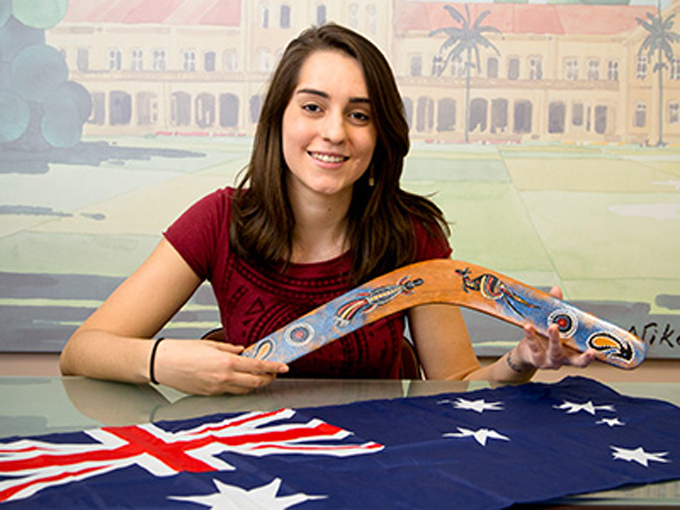Isabela de Freitas Correa is undergraduate student of Biological Sciences
In the last years, around 800 Brazilian students from the Science Without Borders program (CsF) have chosen to enhance their university education in Australia. “Previously, the Chinese students led the statistics of foreigners there, but now, wherever you go in Australia, you can hear someone speaking Portuguese and, almost always, this one is Brazilian”, says Isabela de Freitas Correa, 21 years, student of Biological Sciences at Luiz de Queiroz College of Agriculture (USP/ESALQ).
Between July 2013 and July 2014, through CsF, the student remained in the capital Canberra and took nine courses at the Australian National University, an institution that attracts students from different parts of the world. “I met many Asian, African, North American and South American people there”, she says.
Isabela chose Australia for the weather and the courses offered by the institution. "A friend of mine gave me this reference, I wanted to study abroad and in a place that wasn’t too cold and, in addition, the university there offers conservation and ethics disciplines. Of the nine subjects that I studied, most went through those two areas”.
About the advantages of this period, the student outlines the possibility of getting in touch with culture of the British colonization, beyond the Aboriginal culture, traditional in that country. “After meeting people from different places and also the relations within the university itself, I grew up a lot”. In Canberra, Isabela lived in the university facilities, location that is home to about 300 students between Australian and foreigners. “It's like the student house, but it was paid. It was right next to the buildings where we had classes. Four other Brazilians were living there”. In the area of Biological Sciences, Isabela reminds that biotechnology related to human genetics is one of the strengths in the formation of the Biology student at the Australian National University. “Law and engineering are the most important programs of the university, but biotechnology, my area, is very renowned over there. Overall, Australia pleases any biologist, has a very diverse and rich landscape. I traveled to the main centers and the country is wonderful, a great place to meet people from all over the world”.
Culture shock - In addition to the knowledge acquired in Oceania, Isabela brought back to Brazil impressions about the Australian civility and the difficulties of relationship between the cultures of Aboriginal and British origin. “People are very polite, respect traffic laws and they are extremely welcoming. That surprised me, the streets are very clean, there are bike lanes and they are very far from being a cold people. However, there is still much prejudice against Aboriginal people, the culture from these groups, which are now united in specific places in the country, like our Indians, for example. On the other hand, people who have Aboriginal roots are very proud of this culture and the values it represents”.
Written by: Caio Albuquerque
Translated by: Tobias de Paula Lima Souza
Proofread by: Marisa Aparecida B. Regitano d'Arce
Photo by: Gerhard Waller
Acom (ESALQ’s Office of Communications)
August 12th, 2014


